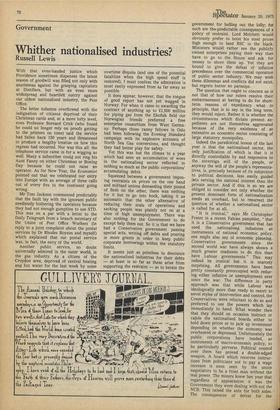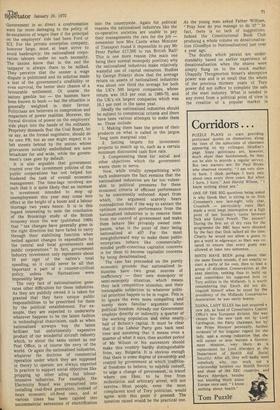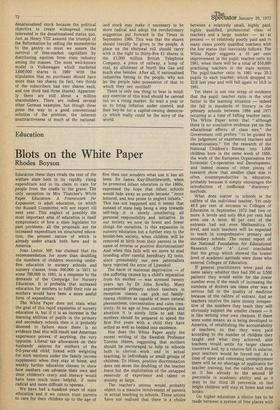Government
Whither nationalised industries?
Russell Lewis
With that even-handed justice which Providence sometimes dispenses the latest season of goodwill was filled not only with anathemas against the grasping capitalists at Distillers, but with an even more widespread and heartfelt outcry against our oldest nationalised industry, the Post Office.
The letter Columns overflowed with the indignation of citizens deprived of their Christmas cards and, at a more lofty level, even Professor Bernard Crick (who found he could no longer rely on proofs getting to the printers on time) said the service had fallen back 150 years and threatened to produce a lengthy treatise on how this regress had occurred. Nor was this all: the telephone service came in for a wigging as well. Many a subscriber could not ring his Aunt Fanny on either Christmas or Boxing Day because he could not raise an operator. As for New Year, the Economist pointed out that we celebrated our entry into Europe with an average of three calls out of every five to the continent going wrong.
Mr Tom Jackson commented predictably that the fault lay with the ignorant public needlessly bothering the operators because they had not enough gumption to use STD. This was on a par with a letter to the Daily Telegraph from a branch secretary of the Union of Post Office Workers (in reply to a joint complaint about the postal services by Dr Rhodes Boyson and myself) which explained that our postal service was, in fact, the envy of the world.
Another public service, no doubt universally admired in the outer world, is the gas industry. As a citizen of the Croydon area, deprived of central heating and hot water for the last week by some overtime dispute (and one of the potential fatalities when the high speed stuff is restored), I must confess the admiration is most easily expressed from as far away as possible.
It does appear, however, that the tongue of good report has not yet wagged in Norway. For when it came to awarding the contract of anything up to £1,500 million for piping gas from the Ekofisk field our Norwegian friends preferred a free enterprise consortium from West Germany. Perhaps those canny fellows in Oslo had been following the Evening Standard campaign with its explosive accounts of North Sea Gas conversions, and thought they had better play for safety.
Yet this was but the climax to a year which had seen an accumulation of woes in the nationalised sector reflected in nothing so much as the public corporations' accumulating debts.
Squeezed between a government imposing restraints on prices on the one hand and militant unions demanding their pound of flesh on the other, there was nothing for it but to go into hock, taking it as axiomatic that the other alternative of reducing their scale of operations and sacking people was plainly not on at a time of high unemployment. There was also nothing for the Government to do except help them out. So it is that we have had a Conservative government passing special acts, writing off debts and pouring in more grants in order to keep public corporate borrowings within the statutory limits.
It seems just as pointless to denounce the nationalised industries for their debts — at least in so far as these arise from supporting the restraint — as to berate the government for ladling out the lolly*, for such are the-predictable consequences of a policy of restraint. Lord Melchett would obviously prefer to hoist his steel prices high enough to land BSC in the black. Ministers would rather see the publicly owned enterprises paying their way than have to go to the House and ask for money to shore them up. Yet they are bound to give the defeat of inflation precedence over the commercial operation of public sector industry. We may wish these dilemmas and conflicts did not exist, but regrets butter no parsnips.
The question that ought to concern us is not that of how our rulers resolve their embarrassment at having to do for shortterm reasons of expediency what in principle, that is to say in the long term, they would reject. Rather it is whether the circumstances which dictate present expedients are not themselves aggravated because of the very existence of so extensive an economic sector consisting of large statutory monopolies.
Indeed the paradoxical lesson of the last year is that the nationalised sector, the only justification of which is that it is directly controllable by and responsive to the sovereign will of the people, or anyway the will of the people's representatives, is, precisely because of its subjection to political decisions, less easily guided into serving the national interest than the private sector. And if this is so we are obliged to consider not only whether the present dominant form of nationalisation needs an overhaul, but to resurrect the question of whether a nationalised sector is called for at all. " It is ironical," says IVIr Christopher Foster in a recent Fabian pamphlet, "that it is a Conservative government that has used the nationalised industries as instruments of national economic policy, one might also say of economic planning. Conservative governments since the second world war have always shown a much greater readiness to do this than have Labour governments." This may indeed be ironical but it is scarcely surprising. All governments have been pretty constantly preoccupied with reducing either inflation or unemployment ever since the war. The difference in party approach was that while Labour was ideologically more than ready to resort to novel styles of intervention and control, the Conservatives were reluctant to do so and preferred to use the powers which lay immediately to hand. What wonder then that they should on occasion instruct or cajole the nationalised boards either to hold down prices or to jack up investment depending on whether the economy was overheated or depressed. Unfortunately the public corporations have tended, as instruments of macro-economic policy, to be particularly perverse. Political control over them has proved a double-edged weapon. A board which receives instructions from politicians not to pay a wage increase is soon seen by the union negotiators to be a front man without the real power. The miners knew last ye,ar that regardless of appearances it was the Government they were dealing with not the NCB. This raised the ante for both sides. The consequences of defeat for the Government in so direct a confrontation were far more damaging to the policy of de-escalation of wages than if the principal on the employers' side had been Ford or ICI. For the private enterprise company, however large, must at least strive to avoid bankruptcy; the nationalised corporation labours under no such necessity. The unions know that in the end the taxpayer is always there to be milked. They perceive that the sooner a wage dispute is politicised and its solution made a test of the government's credibility or even survival, the better their chance of a favourable settlement. Of course the unions gamble too — the busmen have been known to boob — but the situation is generally weighted in their favour. Politicians are believers in compromise and respecters of power realities. Morever, the formal division of power on the employers' side plays into the hands of the militants. Propriety demands that the Coal Board, let us say, as the formal negotiator, should do its own PR; but as one might expect it is left streets behind by the unions whose grievances suitably embellished are soon broadcast far and wide, while the govern ment's case goes by default.
It is also arguable that government control over the investment policies of the public corporations has not helped but hindered the .task of overall economic management. The time-lags involved are such that it is quite likely that an increase in investment intended to mop up unemployment this year may come into effect at the height of a boom and a labour shortage two years hence. It is in this regard interesting to note the conclusion of the Brookings study of the British economy since the war (published 1968) that "tax changes have generally gone in the right direction but have failed to carry through their stabilising function when netted against changes in expenditure by the central and local governments and public corporations." In fact, government industry investment only representsabout 10 per ccent of the nation's total spending, so it could never be all that important a part of a counter-cyclical policy, unless the fluctuations were impossibly large.
The very fact of nationalisation generates other difficulties for these industries.
As they are publicly owned it is taken for granted that they have unique public responsibilities to be prescribed for them by the political establishment. For example, they are expected to underwrite whatever happens to be the latest fashion in technological chauvinism, such as when nationalised airways buy the latest brilliant but unfortunately expensive product of our wonderful aircraft industry which, to about the same extent as our Post Office, is of course the envy of the world. Or again the nationalised industries, whatever the doctrine of commercial operation under which they are supposed in theory to operate, are always expected in practice to support social objectives like propping up other ailing but labour intensive industries. For example, the Electricity Board was pressurised into installing coal-fired generators, instead of more economic oil-fired ones, and at various times has been cajoled into uncommercial extensions of electrification into the countryside. Again for political reasons the nationalised industries like the co-operative societies are unable to pay their managements the rate for the job — remember how Mrs Castle when Minister of Transport found it impossible to pay Mr Peter Parker £17,500 to run British Rail? This is one more reason (the main one being their normal monopoly position) why the nationalised industries make relatively wasteful use of capital resources. Studies by George Polanyi show that the average return on assets of nationalised industries was about one third the average for both the UK's 500 largest companies, whose return was 16.5 per cent in 1969-70, and the UK's six largest companies which was 16.1 per cent in the same year.
Ideally the nationalised industries should be subject to commercial criteria and there have been various attempts to make them so. These include: 1. Making them base the prices of their products on what is called in the jargon 'long term marginal cost.'
2. Setting targets for investment projects to match up to, such as a certain minimum discounted cash flow rate.
3. Compensating them for social and other objectives which the government wants them to serve.
Now, while totally sympathising with such endeavours the fact remains that the nationalised industries are far too vulnerable to political pressures for these economic criteria of efficient performance to be consistently enforced. Apart from which, the argument scarcely bears contradiction that if the way to extract the optimum economic performance from the nationalised industries is to remove them from the control of government and make them behave like privately owned companies, what is the point of their being nationalised at all? For the most straightforward way to make these public enterprises behave like commerciallyminded profit-conscious capitalist concerns is for them to become capitalist concerns by being denationalised.
The case has proceeded on the purely economic grounds that nationalised industries have two great sources of inefficiency — their own monopoly or semi-monopoly situation, which means they lack competitive stimulus, and their inescapable subjection to whatever political priorities happen to be in vogue. This is to ignore the even more compelling and surely more familiar argument about political freedom. Already our Government employs directly or indirectly a quarter of the working population and owns nearly half of Britain's capital. It must be clear that if the Labour Party gets back next time and assuming that it means even a quarter of what it says, then another period of Mr Wilson or his successors should make this country hardly distinguishable from, say, Bulgaria. It is obvious enough that there is some degree of ownership and control by government at which tradition al freedoms to believe, to express oneself, to urge a change of government, to travel where one likes, to be free from molestation and arbitrary arrest, will not survive. Most people, even the most complacent kind of Tory politician, would agree with this point if pressed. The question raised would be the practical one. As the young man asked Father William, "Pray how do you manage to do it?" In fact, there is no lack of suggestions. Indeed the Constitutional Book Club produced a whole volume on denationalisation (Goodbye to Nationalisation) just over a year ago.
The doubts which persist are understandably based on earlier experience of denationalisation when the shares were simply flung on to the stock market. Uhappily Throgmorton Street's absorptive power was and is so small that the whole of the previous thirteen years of Tory power did not suffice to complete the sale of the steel industry. What is needed in any event from a political point of view is the creation of a popular market in denationalised stock because the political objective to create widespread vested interested in the denationalised status quo. Just as Henry VIII assured the triumph of the Reformation by selling the monasteries to the gentry so must we assure the survival of free-market capitalism by distributing equities from state industry among the masses. The most well-known model is Volkswagen which marketed 3,600,000 shares in 1960 with the stipulation that no purchaser should have more than ten shares (in fact, two thirds of the subscribers had two shares each, and one third had three shares). Apparently there are still about a million shareholders. There are indeed several other German examples, but though these point the way to a good conventional solution of the problem, the inherent unattractiveness of much of the national ised stock may make it necessary to be more radical and adopt the revolutionary suggestion put forward in the Times in September 1968. This was that the shares should literally be given to the people. A place on the electoral roll should carry with it the right to thirty-five El shares in the £1,000 million British Telephone Company, a piece of railway, a lump of coal, an allotment of North Sea Gas and much else besides. After all, if nationalised industries belong to the people, why not let the people take possession of that to which they are entitled?
There is only one thing to bear in mind: any exercise of this kind should be carried out on a rising market. So wait a year or so to bring inflation under control, and then hey-ho for a capital-owning democracy which really could be the envy of the world.




































 Previous page
Previous page